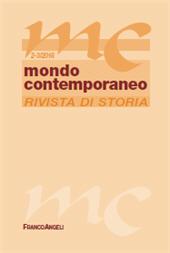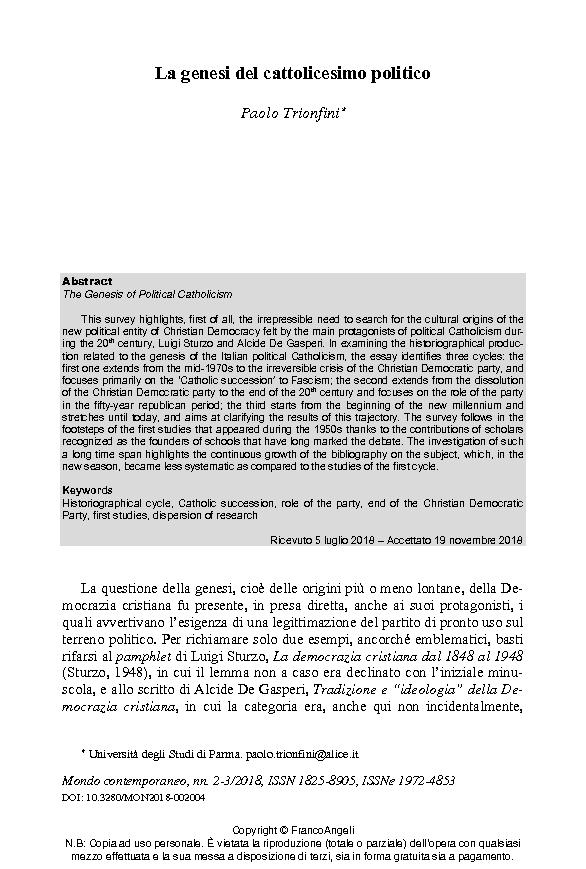La genesi del cattolicesimo politico
33-45 p.
La ricognizione mette primariamente in luce l'esigenza insopprimibile della ricerca, come forma di legittimazione, dei cespiti culturali del nuovo soggetto politico della DC ad opera dei protagonisti assoluti del cattolicesimo politico nel corso del Novecento: Luigi Sturzo ed Alcide De Gasperi. Il saggio, nell'esaminare la produzione storiografica relativa alla genesi del cattolicesimo politico, individua tre cicli: il primo si dipana dalla metà degli anni Settanta alla crisi irreversibile della Democrazia cristiana, per concentrarsi soprattutto sulla «successione cattolica» al fascismo; il secondo si distende dalla chiusura dell'esperienza storica del partito alla fine del secolo, per mettere a fuoco il ruolo del partito nel cinquantennio repubblicano; il terzo prende le mosse dal nuovo millennio per approdare fino a oggi, per chiarire gli esiti della traiettoria percorsa.
La scansione si riallaccia, peraltro, ai primi studi che si affacciarono nel corso degli anni Cinquanta grazie ai contributi di studiosi riconosciuti come capostipiti di scuole che hanno segnato a lungo il dibattito. L'approfondimento su un periodo relativamente lungo permette di sottolineare la lievitazione continua della bibliografia in argomento, che, nella nuova stagione, è risultata se non altro più dispersiva, dopo le indagini del primo ciclo. [Testo dell'editore].
This survey highlights, first of all, the irrepressible need to search for the cultural origins of the new political entity of Christian Democracy felt by the main protagonists of political Catholicism during the 20th century, Luigi Sturzo and Alcide De Gasperi. In examining the historiographical production related to the genesis of the Italian political Catholicism, the essay identifies three cycles: the first one extends from the mid-1970s to the irreversible crisis of the Christian Democratic party, and focuses primarily on the 'Catholic succession' to Fascism; the second extends from the dissolution of the Christian Democratic party to the end of the 20th century and focuses on the role of the party in the fifty-year republican period; the third starts from the beginning of the new millennium and stretches until today, and aims at clarifying the results of this trajectory.
The survey follows in the footsteps of the first studies that appeared during the 1950s thanks to the contributions of scholars recognized as the founders of schools that have long marked the debate. The investigation of such a long time span highlights the continuous growth of the bibliography on the subject, which, in the new season, became less systematic as compared to the studies of the first cycle. [Publisher's text].
Ist Teil von
Mondo contemporaneo : rivista di storia : 2/3, 2018-
Artikel aus derselben Ausgabe (einzeln erhältlich)
-
Informationen
ISSN: 1972-4853
KEYWORDS
- Ciclo storiografico, successione cattolica, ruolo del partito, esito della DC, primi studi, dispersione della ricerca
- Historiographical cycle, Catholic succession, role of the party, end of the Christian Democratic Party, first studies, dispersion of research



